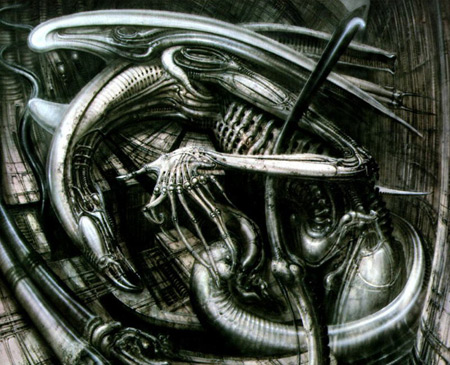I recently had the misfortune of watching Prometheus, a movie I had expected Ridley Scott would use to further push the potential science fiction. Needless to say he didn't. Scott has been known throughout his career of reinventing science fiction. Alien left us with questions on the preciousness of life, the consequences of death, and the expendability of human life. In fact, Alien can be viewed in two ways: as a story of evil corporations and their employees being expendable, or as one big metaphor for procreation, impregnation, gestation, painful childbirth, maturation, and death. Bladerunner also explores expendability of life, but more especially with slaves, and brings forth the question of are we allowed to kill what we create?
While some of these things were present in Prometheus, the overwhelming question of the movie was ultimately futile: where did we come from and why? Why is this a stupid question? To put it simply, it's a question that isn't exactly answerable. It has no end, and if it does have an end, then the end of the answer is a cop-out.
Prometheus posits that some other alien race created us. Then they wanted to kill us. Why? Who know. Scott never answers this question. Bladerunner and Alien ask if this is ethical, but never asks why were we created. Prometheus doesn't care if it's ethical to kill that which you created, but rather where did we come from and why. So Dr. Shaw, who is Christian, clearly has some faith issues. She believes aliens made us, but she still believes in Christ her savior. Exactly why Scott has thrown religion into this film is beyond me. He usually sticks to religious ambivalence or a near atheistic point of view in his films. But this one, Christianity wins (I guess Scott is getting old and is turning back to the Bible), or at least isn't rejected. We're off to meet our maker, who isn't God, but we still believe in God... right? Androids don't worship God, nor do they worship us (they serve us).
If we were created by aliens (because fuck Darwin), then the obvious question is: who created them? More aliens? Who created them? More aliens? It's a vicious cycle that usually terminates with God. God created everything. But when asked who created God, the trump card is pulled, because nothing created God. God always existed. I may believe in God, but the God-trump-all-card is not a worthy argument in scientific debate.
Why is this stupid to ask? Because it has no real answer, and any answer is a cop-out. I call it idle philosophy, a term I get from John Milton. Asking these sorts of questions get us nowhere, at least nowhere satisfying. We either end up with no answer ("I don't know where we came from"), an answer that is a paradox ("We created God who then created us"), or an illogical conclusion, a cop-out ("God did"). This is why Zen Buddhists usually give strange answers to certain questions. If you ask a Zen Master who created us, they would probably respond with "Mu." It's not an answer because there isn't one. If you ask a stupid question you get a stupid answer, so you shouldn't ask them.
Overall the movie was disappointing. It's okay for a movie to ask questions and not answer them, but it is supposed to make us think (something Borges does a lot in his short stories). But to barely give a premise of philosophy, throw around a bunch of vague questions, and NEVER EXPLAIN THE ALIEN! leaves me a bit disgruntled. Are we supposed to be looking at these questions on the origin of life from a religious point of view or a panspermic one? (Because, again, fuck Darwin). Are we supposed to think of ourselves as cattle or a wrongful experiment? Who exactly is the protagonist, so that we can understand which point of view to weigh more heavily? Is it Shaw or David or the Engineers?
Was there even a philosophy? Was there even a plot?

No comments:
Post a Comment